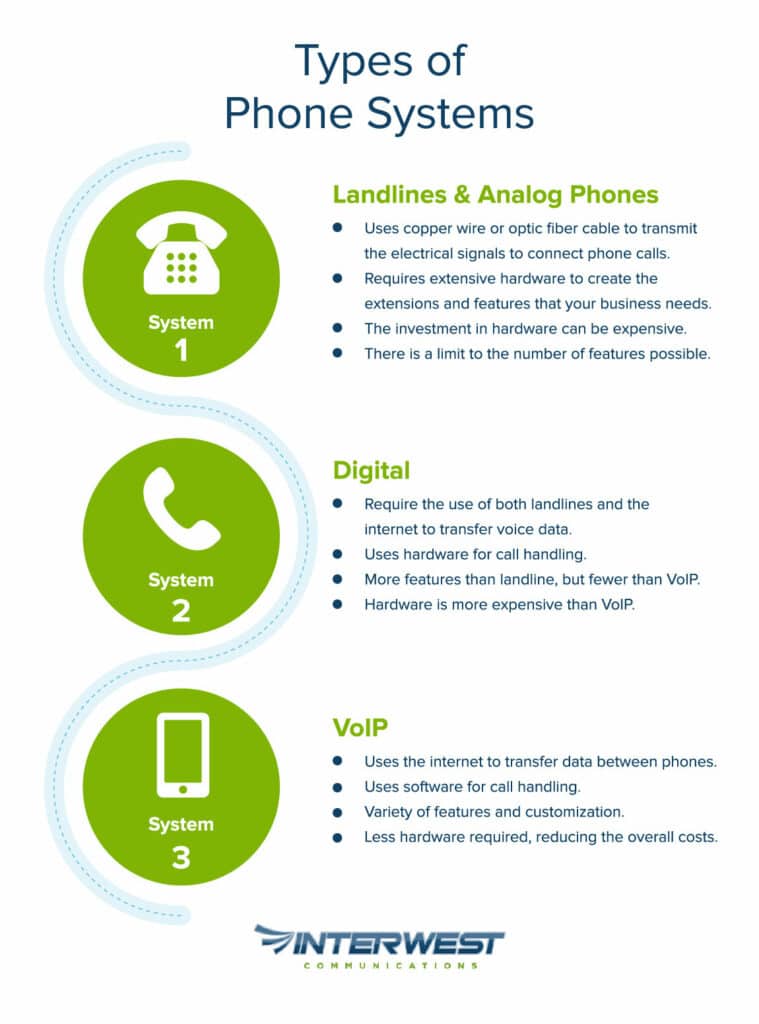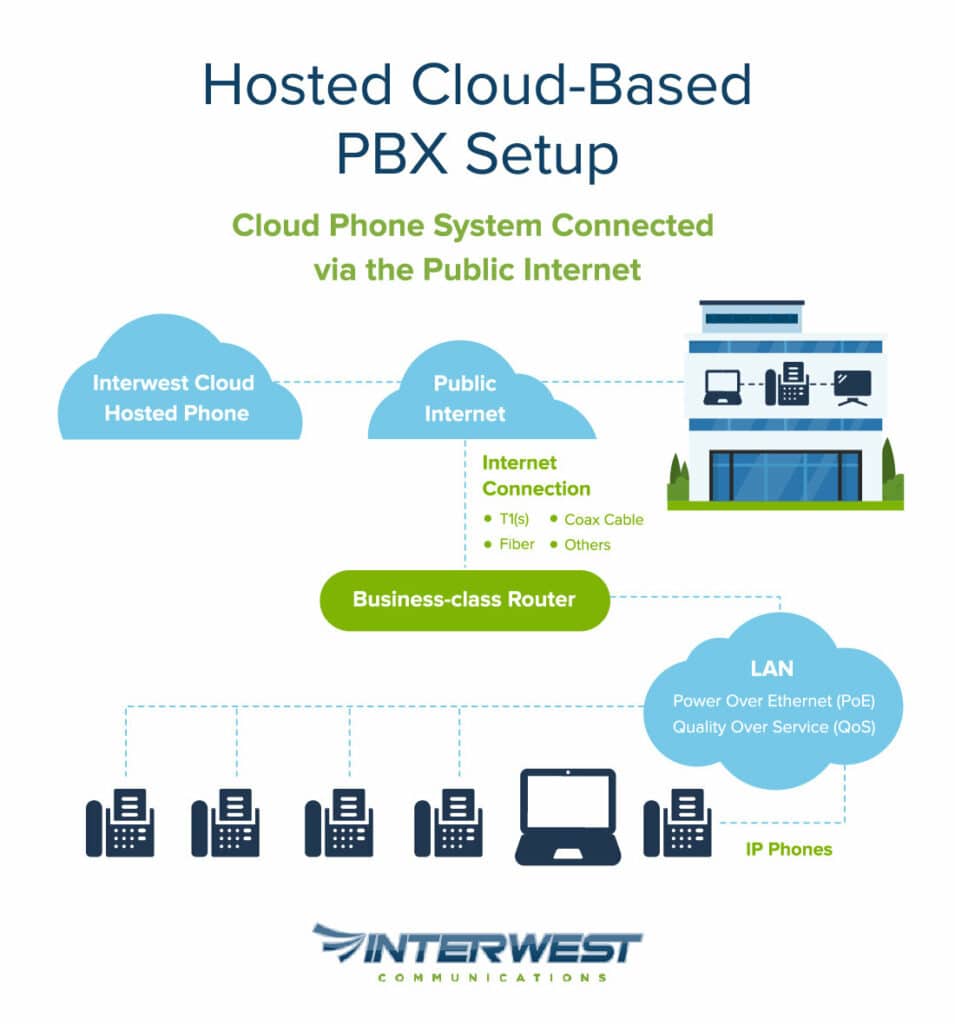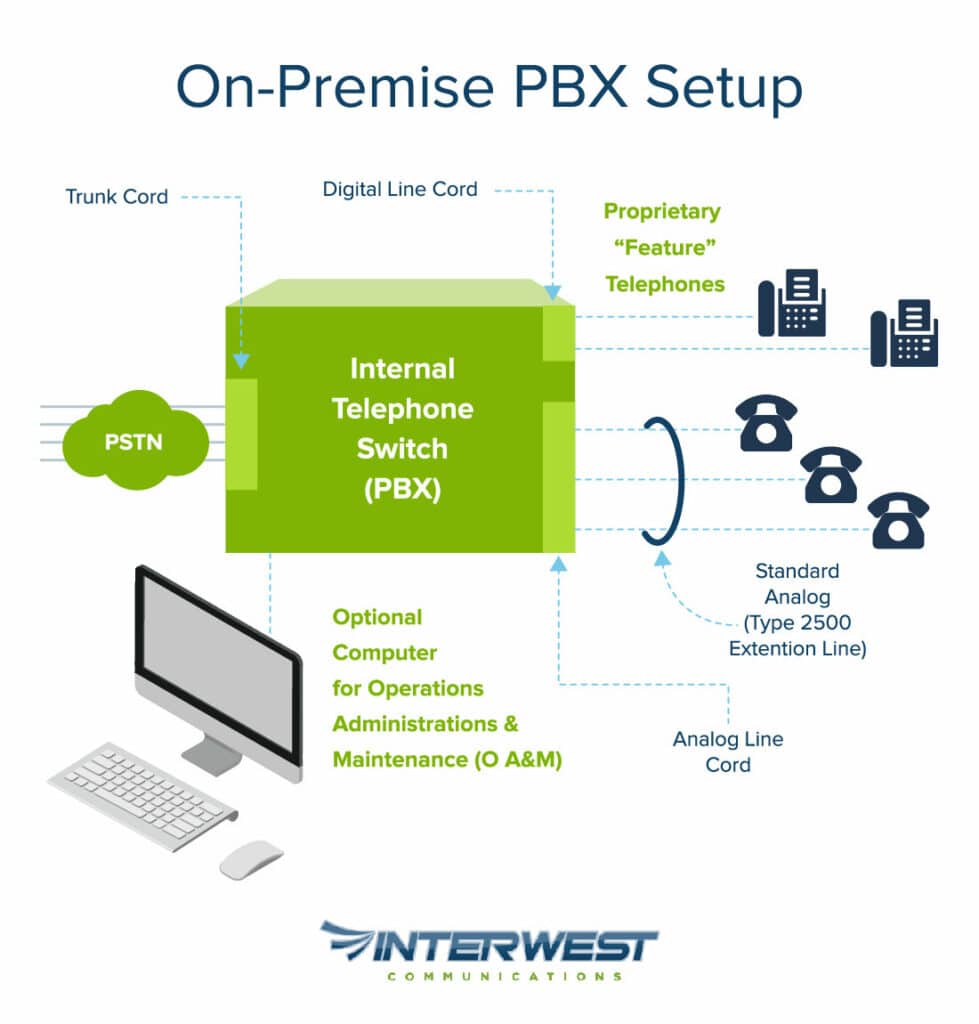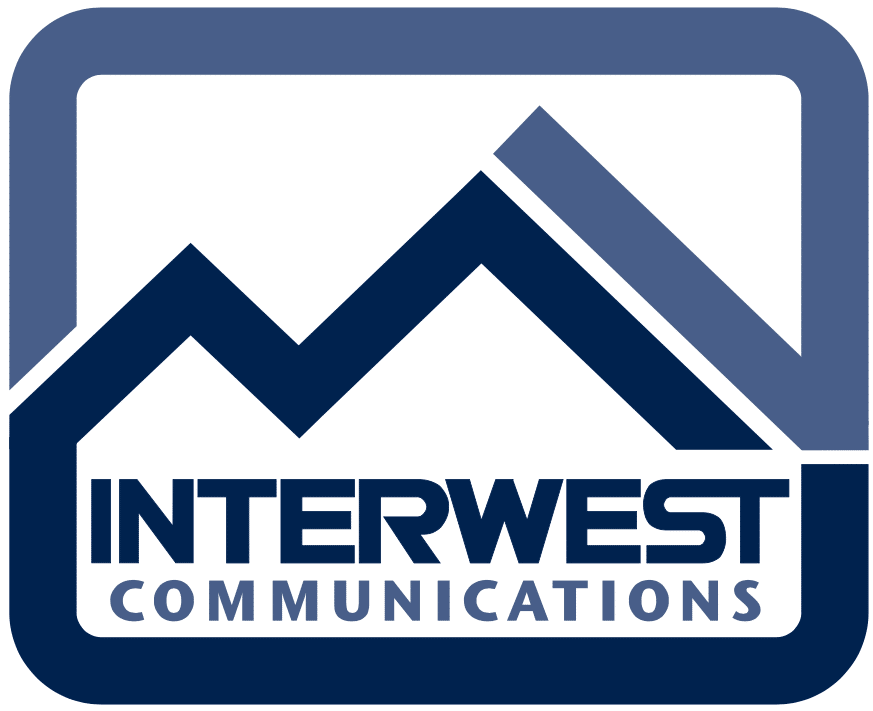- June 30, 2025
- Posted by: Interwest Communications Team
- Categories: News, Uncategorized

Originally posted on July 10, 2020 @ 7:09 pm

Modern businesses need to be able to keep up with the fast-paced nature of communication, and they need the information technology that allows them to do so.
A phone system is like the circulatory system of the business. It is responsible for both transporting information between businesses, and members within a business. That information, and the phone systems used to share it, are vital to keeping a consistent workflow and also keep the company running.
While some businesses allow employees to use their personal phones, this can often result in unreliability as well as many security vulnerabilities. On top of this, shoddily done phone systems can result in bad communication that leads to missed calls and mistakes. Lack of voicemail services can also mean missed opportunities and businesses losses.
Centralized phone systems that use a Private Branch Exchange (PBX) are more secure and functional. Choosing the right one can have major ramifications for your organization, and we’re here to help you pick the right one.
At Interwest, we can help you determine the best phone system for your business. We’ll go through the factors to consider, and what features work best for different businesses.
Business Size & Phone System Scalability
When you’re choosing a phone system, you want to think about how large your business is, and the size that it can potentially scale to become. This calculation is what determines what kind of phone system you ought to be looking for, and will affect the features and pricing you’ll get, but we’ll talk a little bit more about that in a moment.
If you’re planning on growth (or possibly downsizing), you want to make sure that your phone system will also scale to meet those needs. Avoiding excess is always a good plan when creating a phone system, but outgrowing the phone system also has negative ramifications.
Cost
Cost is a factor in nearly every business endeavor, and it structures many of the decisions that we make in our lives. When thinking about phone systems, and when evaluating the potential costs, you’ll need to know the number of users for your phone as well as the number of individual phone sites you’re planning on having or scaling to. This will help you ballpark the overall costs of the system, and will give you the wiggle room you might need when thinking about phone models.
Phone System Features & Customization
Voicemail, call forwarding, and contact management are just a few of the features that make business communications easier. Every business has unique needs and therefore requirements for different features. Some businesses need features like analytics and mobility, while others only need voicemail. Determining the features your business needs is one of the most important factors to consider when determining the best phone system for your business. The availability of phone system features usually depend on the type of connection and the hardware the phone system uses.

Types of Phone Systems
Ultimately, there are three types of telephone systems based on the type of connection they use:
1. Analog Phone Systems, which use a public switched telephone network (PSTN), known as landlines, to connect calls.
2. Digital Phone Systems, which use both landlines and the public internet to connect calls.
3. Voice over Internet Protocol (VoIP), also called internet telephony, broadband telephony, and broadband phone service, which uses the internet to connect calls.
1. Landlines & Analog Phone Systems
Landlines are Public Switched Telephone Networks (PTSNs) managed by telephone or communications companies. Basically, landline systems use copper wire or optic fiber cable to transmit the electrical signals required to connect phone calls. When you use a landline, you have to have the hardware necessary to create the extensions and features that your business needs to use.
The investment in hardware can become expensive depending on the size of the company and the number of features added. The type of PBXes that used a landline is analog, and there is a limit to the number of features possible for landlines and analog PBXes.
2. Digital Phone Systems
Digital phone systems are what replaced analog phone systems, and are still used by many businesses. They require the use of both landlines and the internet to transfer data. This type of system uses hardware for call handling, which can increase the costs.
3. VoIP Phone Systems
Short for Voice over Internet Protocol, this type of phone system uses the internet to transfer voice data between phones. VoIP uses software for call handling which allows for a variety of features and customizations, while also reducing the overall costs. The service is provided by internet providers that use massive data centers.
Security
VoIP and digital phone options combine your phone service with your data service, which means that security then becomes a serious factor. A business’s PBX and network security measures are important to mitigate the risk of unauthorized access and loss of sensitive information and damages to the business. Taking security measures and resources into consideration is important when choosing the right phone system for your business.
On-Premise vs. Hosted Cloud PBX
After connectivity, types of phone systems, their features, cost, and scalability are based on the platform that they are managed on. Many VoIP PBXes are cloud based because the internet is all that is needed to operate it, rather than depending on hardware that makes up an on-premise PBX.
With Interwest On-Premise, your calls are routed through a traditional phone company as well as through a VoIP using SIP trunking. Interwest’s cloud-based and on-premise PBX systems both include VoIP options and features like:
-
Call control
-
Collaboration
-
Mobility
-
Call management
-
Voicemail
-
Messaging
-
Contacts
-
Web-based management
-
Call training
-
Integrations
-
Contact center
-
Analytics

What is a Hosted Cloud PBX
Cloud-based PBXes are phone systems that operate thanks to technology and equipment that is managed and housed by a provider. Businesses pay a monthly fee to access a hosted cloud-based PBX via the internet. For example, Interwest has five data centers that host our cloud-based system across the country so we can ensure provision of reliable services to our customers. Partnering with a hosted cloud service gives a business access to the features and resources they would be unable to access in isolation.
The downside of many cloud-based services is that they sometimes have difficulty scaling to a large deployment in a cost-effective manner, but they’re recommended for any business that wants to conserve IT dollars, making them perfect for startups or mid-sized businesses.

What is an On-premise PBX
On-premise PBXes are phone systems that are housed and managed on-site by a business. If you get an on-site package from us, you purchase the phone system with the installation, and we configure, install, and train your staff how to use it for a low fee. This gives you more control over your phone system, with the help of our experts. On-premise systems provide more flexibility but consume IT resources.
On-premise phone systems are recommended for small and medium-sized businesses or enterprises with available IT resources who have the need for more control over their phone system or require more customized features.
What is a Hybrid PBX
Hybrid PBX uses cloud-hosted and on-premise PBX, so you get the best of both worlds — service providers are there to help you host and manage certain components, while you still have control of other components. This is more labor-intensive because you need to make sure those different components are compatible with each other to prevent interference, but can be an effective method for businesses with unique needs.
This also means you’re paying for the best of both worlds. Using a hybrid PBX is not the most cost effective option, as it means making an upfront investment in hardware and dedicating IT resources like an on-site pbx, while also paying the monthly fee for a cloud-hosted PBX.
Professional Phone System Providers & Support
Regardless of what type of phone system you’re looking for, Interwest Communications has the tools, knowledge, and experience to help meet your business communication needs. Get in touch with one of our customer service representatives for more information, we’re available for 24/7 support.
